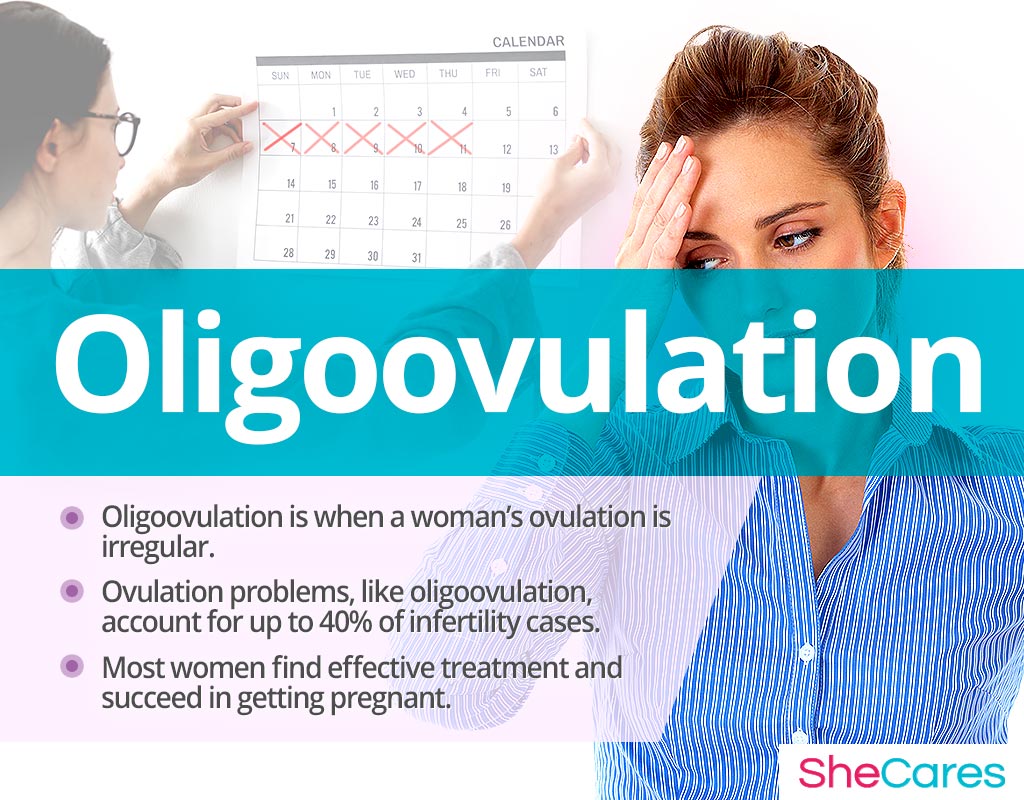What is Oligoovulation?
Oligoovulation is a medical term to describe irregular or infrequent ovulation. Normally ovulation occurs 14 days before a period bleed.
Oligoovulation differs from anovulation, which is when there is no egg release from the ovaries and, as such, a woman is not ovulating. The ovaries of women with oligoovulation are releasing eggs, but they do so either too early or too late.
Early Ovulation
It is when a woman ovulates before her estimated ovulation date. It is difficult to precisely define what early ovulation is as every woman's cycle length varies, especially if she is suffering from irregular periods as well.
For instance, a woman who has short menstrual cycles along with early ovulation might ovulate right after or during bleeding, in which case her fertile window will overlap with her period.
Late Ovulation
It occurs when a woman ovulates after her expected ovulation date, often in less than 10-12 days before her next period. A late ovulation means that the luteal phase (following egg release) of the menstrual cycle is very short.
It is also possible for women with irregular ovulation to skip a cycle and not ovulate in a given month.
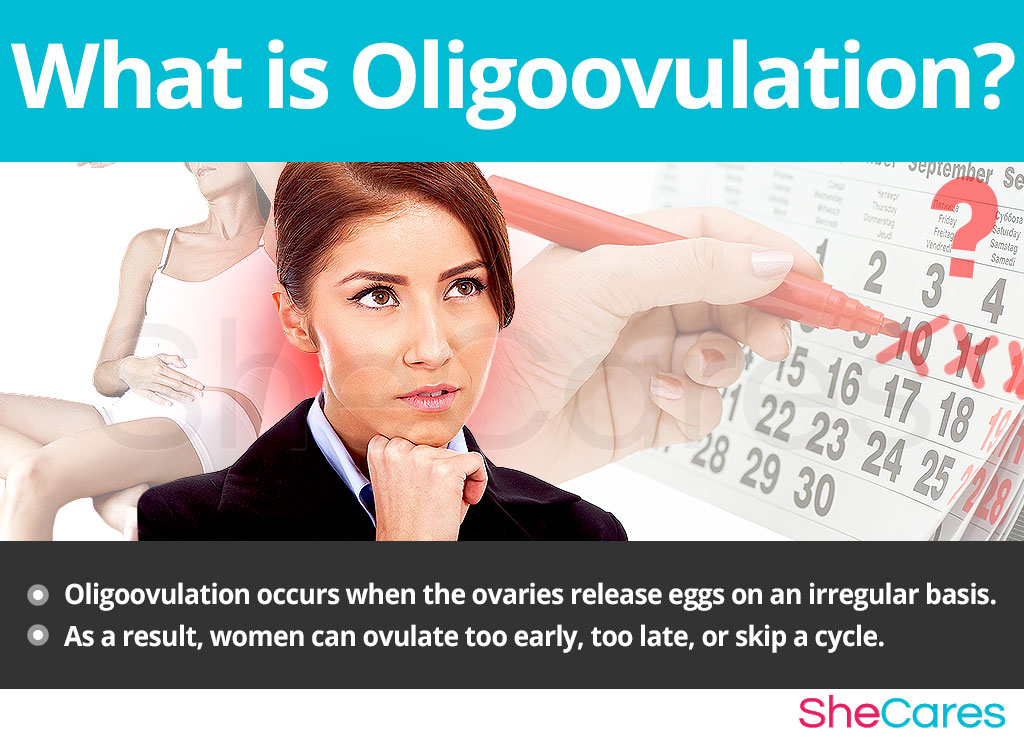
Causes of Irregular Ovulation
The underlying cause of irregular ovulation is hormonal imbalance manifested in various conditions.
By far, the most common cause of oligoovulation is polycystic ovary syndrome (PCOS). It is a hormonal disorder affecting up to 10% of women of childbearing age. Constantly high levels of androgens, typical to PCOS, can disturb the process of ovulation.
It is also common for women to have irregular ovulation when entering the menopausal transition and nearing the end of their reproductive years. Similarly, teenage girls who just experienced their first period, menarche, might also be ovulating too early or too late.
Other Causes of Irregular Ovulation
- Obesity (BMI 30 or above)
- Underweight (BMI 18.5 and below)
- Strenuous exercise
- Premature ovarian failure
- Low ovarian reserve
- Thyroid disease
- Prolonged stress
- Hyperprolactinaemia
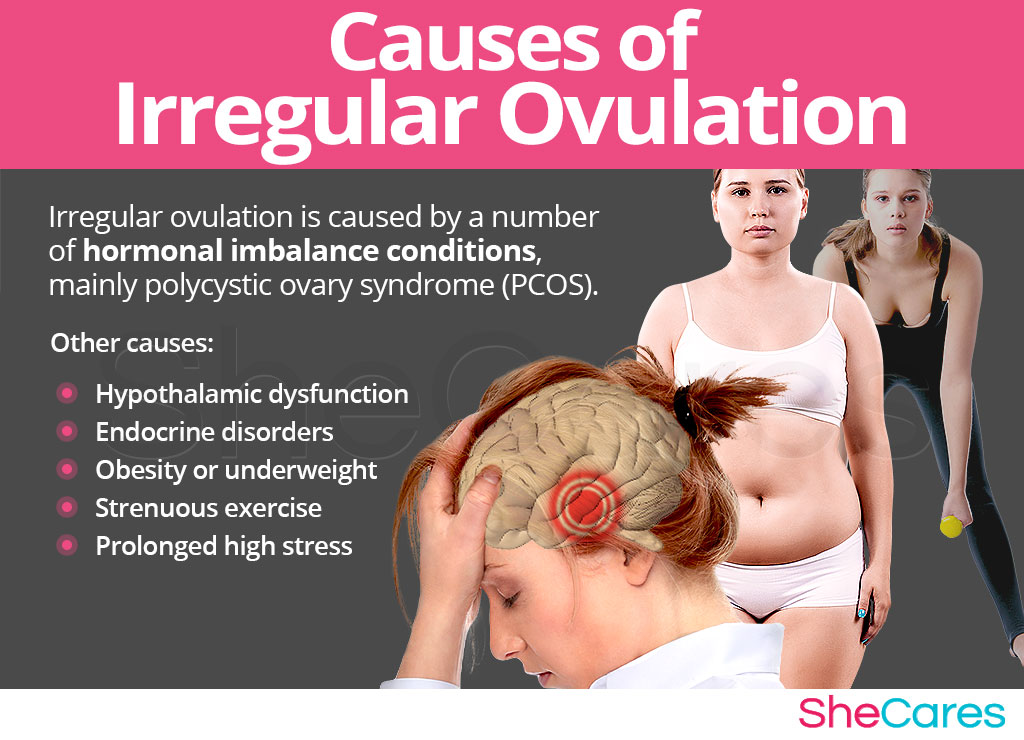
Effects of Early of Late Ovulation on Fertility
Irregular ovulation causes subfertility, a term used to describe a state of lowered ability to conceive.
This is due to the fact that a woman might struggle to predict when she will ovulate in a given cycle; therefore, estimating her fertile window and accurately timing it with having sex can be a challenge.
Although it might take longer for a couple to conceive, ovulating early or late in a cycle and getting pregnant is still very much possible.
Moreover, because oligoovulation-triggered infertility can be effectively treated, the majority of couples go on to have healthy pregnancies.
Diagnosis of Irregular Ovulation
A woman may not know that her ovulation is irregular until she is actively trying to conceive, which makes diagnosing oligoovulation more challenging. The doctor will confirm the diagnosis based on signs and symptoms as well as diagnostic tests.
Signs and Symptoms of Irregular Ovulation
In most women with oligoovulation, irregular periods and ovulation go hand in hand. However, it is possible to be ovulating too early or to have late ovulation with more or less regular menstruation.
Menstrual abnormalities
Abnormal periods are the most common symptom of irregular ovulation.
Cycles longer than 35 days (often longer than 50 days)
Infrequent periods (eight or fewer periods in a calendar year)
Inconsistently irregular cycles (length changes month to month)
Hormonal Imbalance
The main sign of oligoovulation are abnormal levels of reproductive hormones, such as estrogen, progesterone, or luteinizing hormone (LH), as well as thyroid hormones,including thyroid-stimulating hormones (TSH).
Other signs of oligoovulation might be specific to various medical conditions associated with oligoovulation, such as hirsutism or acne common with PCOS.
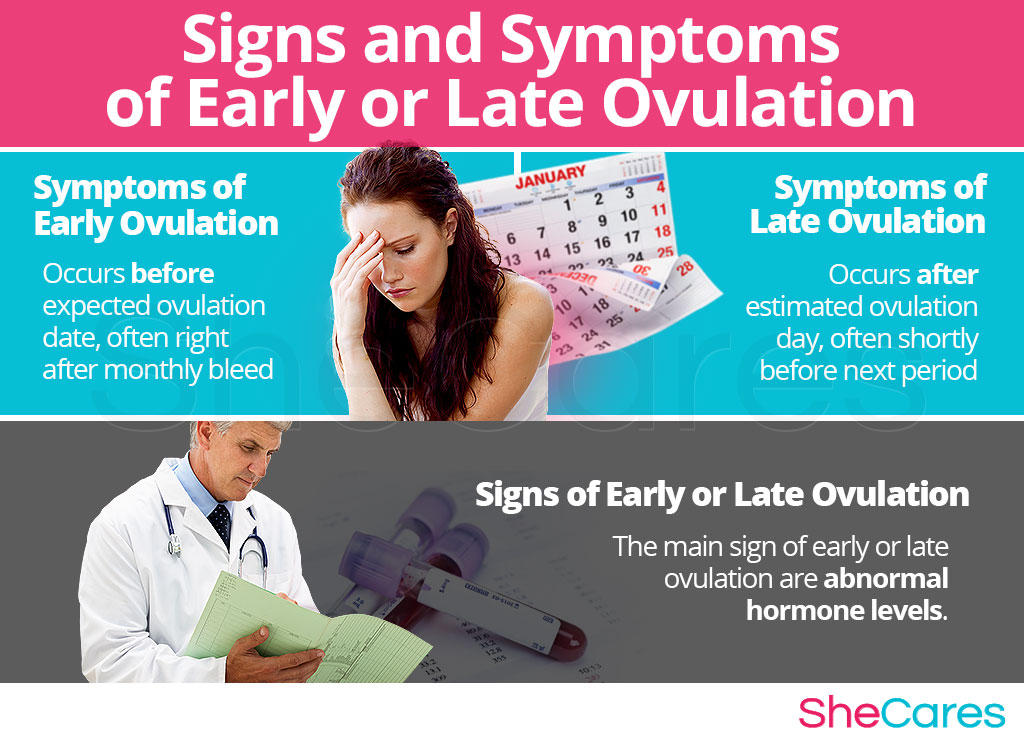
Irregular Ovulation Tests
At-Home Ovulation Tests
Because estimating when ovulation will occur in a given month might be difficult for women with oligoovulation, it is essential for them to learn how to recognize the signs and symptoms of ovulation. It can be done with the following methods:
Measuring basal body temperature can trace slight changes due to hormonal fluctuations around ovulation.
Checking cervical mucus for fertility can help pinpoint ovulation several days before it occurs.
Checking cervical position manually can give hints that the body is preparing for ovulation.
Ovulation test kits detect the LH surge, which triggers the egg release.
Ovulation microscopes trace ferning patterns in the saliva due to rising estrogen before ovulation.
Medical Tests
- Blood tests for levels of reproductive hormones might give clues for the reasons for ovulation abnormalities. A blood test can also rule out other underlying causes, such as thyroid disorders.
- Transvaginal ultrasound can rule out anatomical abnormalities of the reproductive organs, identify ovarian cysts, and give a view of the developing follicles.
Irregular Ovulation Treatment
The treatment for irregular ovulation comprises of ovulation induction,which can be achieved with a range of lifestyle habits, herbal supplements, or pharmaceuticals.
For those with low ovarian reserve or premature ovarian failure, neither of the treatment options is likely to bring the desired results.
Lifestyle Changes
- Weight control. Insufficient or excess weight might cause a miscommunication between the brain and the ovaries to produce hormones, mature eggs, and then release them. Studies have shown that reaching a normal body mass index (BMI) can make monthly egg releases more regular.
- Stress reduction. Elevated cortisol levels can have detrimental effects on hypothalamus' control of reproductive hormone production, thus affecting ovulation. Making stress reduction through meditation, yoga, or breathing techniques a daily routine can regulate hormones and ovulation.
- Proper nutrition. Dietary deficiencies can also affect the functioning of the brain and reproductive organs. A diet rich in phytoestrogenic and full-fat foods as well as healthy fats (from nuts, avocado, etc.), protein (from fish, chicken, beans, etc.), and slow-release carbohydrates (from whole grains, vegetables, and fruits) can alleviate irregular ovulation.
- Physical activity. Strenuous exercise can stop menstruation and ovulation. Opting for lighter exercises, such as swimming, jogging, or Pilates, can not only restore ovulatory cycles, but also help reach and maintain an ovulation-friendly weight.
Alternative Medicine
Phytoestrogenic supplements, like ginseng or black cohosh, have been shown to encourage hormonal production to make periods and ovulation regular and healthy.
Hormone-balancing supplements, such as Macafem, nourish the endocrine and adrenal glands to regulate hormonal production, thus resolving late or early ovulation and increasing the chances for conception.
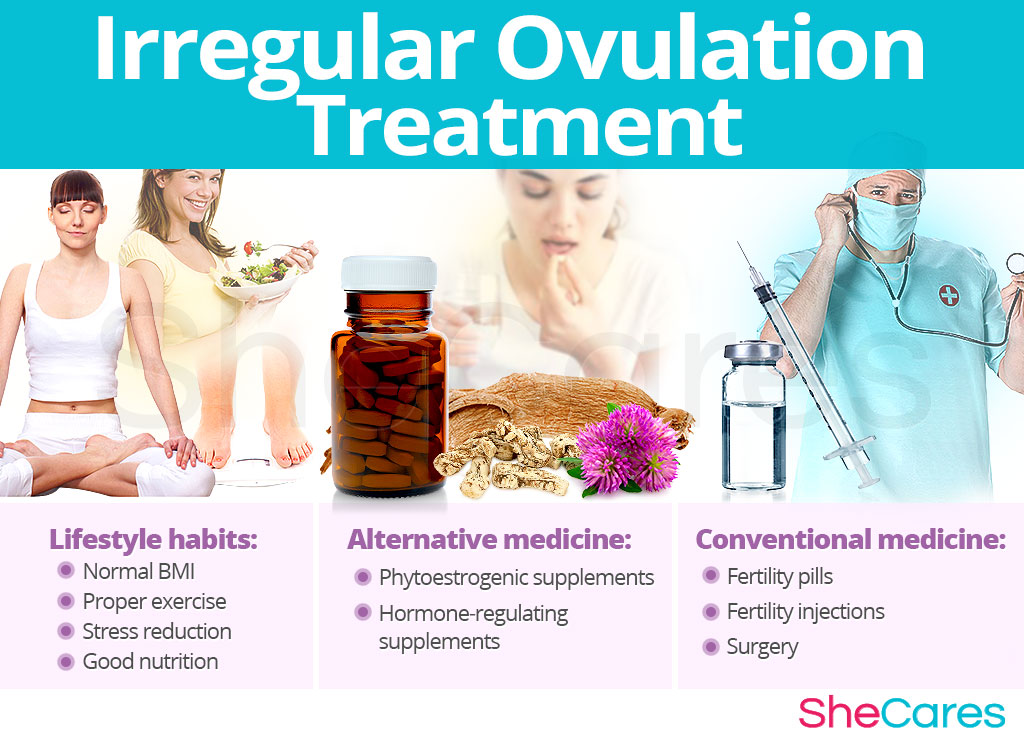
Medical Options
- Fertility pills and injections contain hormones and are designed to stimulate the production and release of eggs. They are typically used short-term.
- Surgery is not a common way of treating oligoovulation. However, PCOS women might benefit from a procedure called ovarian drilling or ovarian wedge resection, both designed to trigger or regulate ovulation.
These ovulation-stimulating pharmaceuticals are also used for infertility treatment or implemented to make the use of assisted reproductive technologies, like IVF, more effective.
Key Takeaways
Oligoovulation, which is when ovulation is irregular or infrequent, can be a significant obstacle for women trying to get pregnant as it decreases their chances of conceiving. Mainly caused by PCOS, infrequent or irregular ovulation usually occurs in conjunction with irregular periods. Luckily, ovulation can be regulated with good lifestyle habits, like reaching a healthy BMI; taking phytoestrogenic and hormone-balancing supplements like Macafem; and using fertility drugs and injections. These and other approaches can improve hormonal balance, thus restoring a woman's ovulatory cycles and boosting her fertility.
Sources
- British Medical Journal (2007). Managing anovulatory infertility and polycystic ovary syndrome. Retrieved September 28, 2018 from https://www.ncbi.nlm.nih.gov/pmc/articles/PMC1995495/
- National Collaborating Centre for Women's and Children's Health. (2013). Ovulation disorders. Retrieved September 28, 2018 from https://www.ncbi.nlm.nih.gov/books/NBK327781/
- Office on Women's Health. (n.d.). Infertility. Retrieved September 28, 2018 from https://www.womenshealth.gov/a-z-topics/infertility
- The Journal of Clinical Endocrinology and Metabolism. (2010). Oligoovulatory and Anovulatory Cycles in Women with Polycystic Ovary Syndrome (PCOS): What's the Difference? Retrieved September 28, 2018 from https://academic.oup.com/jcem/article/95/12/E485/2835423
